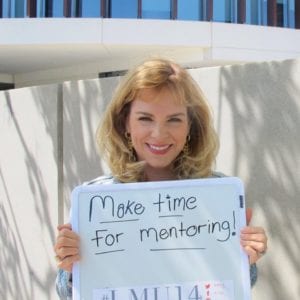 Last week I was interviewed for Fast Company and one of the great ideas that the journalist, Laura Vanderkam, gave me was to create an FAQ that I can send to people when they ask to do an informational interview with me or they want to meet me the first time for mentoring advice and mentoring success strategies. Read on for my mentoring and informational interview FAQ!
Last week I was interviewed for Fast Company and one of the great ideas that the journalist, Laura Vanderkam, gave me was to create an FAQ that I can send to people when they ask to do an informational interview with me or they want to meet me the first time for mentoring advice and mentoring success strategies. Read on for my mentoring and informational interview FAQ!
Mentoring and Informational Interview FAQ
Ellen A. Ensher, Ph.D.
Professor of Management, Loyola Marymount University
1) How did you discover your interest in I/O Psychology/ OB/HR?
I was a Psych major in College (actually attended Loyola Marymount University where I am now a Professor). When I entered into the Psych program I came into it because my own family was a little nutty and I think I just wanted to understand that! I did a series of internships while in college. The first one was with the kids who had attended McMartin preschool… this group of kids and the case was infamous as the caregivers had been accused of widespread sexual assault – it was really horrific stuff but at the end of the day sadly no one really knows what happened – so in my internship I got to play with the kids in between their counseling appointments.
I realized it was important work but not for me. I was not really great with little kids and I did not enjoy it (luckily I think my kid skills improved when I became a mom). Next, I did an internship with at risk teens… and I did not like that much either. I was running out of career options as a psychologist until my senior year I took a class in the College of Business with Dr. Charlie Vance and learned about a career in Organizational Behavior and Human Resource Management.
I learned about Human Resource Management and realized I was drawn to making people’s lives better at work. After my college graduation, I got a job in Human Resources which was pretty entry level and boring but it did give me the realization that I wanted to pursue HR at a higher level so I got into the field of Training and Development and got my Masters.
2) How did you get interested in studying mentoring?
My interest in mentoring was a direct result of the Los Angeles riots. After the LA riots, I was working for my mentor as a training consultant at the LA Times, while in graduate school earning my doctorate in Organizational Behavior. She had put together a jobs training program to help inner city youth get a job at the LA Times and develop their professional skills.
Part of this program was for the kids to be paired with a mentor. The basic question she wanted me to research was “Does race matter?” In other words, should kids be paired with same-race versus different-race mentors? This led to my first academic publication (Effects of Race, Gender, Perceived Similarity, and Contact on Mentor Relationships) and my passion for studying mentoring.
3) So what do you really do? What’s an average day like?
Lots of different things but for me I am a college professor first and an author and speaker/consultant second. My area of research/writing/speaking expertise is writing is all about mentoring and careers. So, basically all of my efforts are focused on helping people be happy and reach their full potential at work. So, for me my week has a rhythm that changes.
This semester I teach on a Tuesday/Thursday schedule which means I am in class about 5 hours that day and in between see students to coach them on grades, course assignments, or their careers. On Monday, Wednesday, Friday, I prep for class and do everything else. So in a given week, I might talk to a reporter for Fast Company about mentoring, chat with a CEO who focuses on e-mentoring about his business or focus on one of my research projects. In between, I take my son the lunch he forgot, swim, call my mom back and figure out what the hell is for dinner. In short, every day I ask myself what do I absolutely need to do and try to just do that and then call it enough.
4) What kind of educational background do you need to have?
For me, as a Professor you absolutely need a Ph.D. I have a Masters in Public Administration with an emphasis in Training and Human Resource Development. My Ph.D. is in Organizational Behavior from Claremont Graduate University.
5) What is the worst thing about your job?
I hate grading papers and exams. It is both tedious and terribly important and stressful. I also dislike organizational politics which tends to be very time consuming and counter-productive.
6) What is the best thing about your job?
Autonomy and flexibility in terms of what I teach, write, learn and study. Also, feeling like my work matters and is helpful to people.
7) What advice can you offer to someone breaking into the field of I/O Psych/ Consulting/Academia?
Get into the best possible graduate program. Pedigree matters and it will follow you for the rest of your life. You will be judged by where your degree is from and who your academic mentors were, along with the work that you do. Be gracious and kind to your fellow consultants and academics. My best referrals for consulting has come through my network so pay it forward and it will come back to you.
